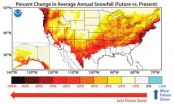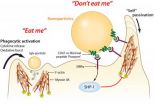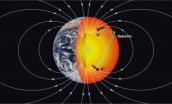(Press-News.org) WASHINGTON, DC – With only one week left before sequestration is to take effect, America's research community sustained its call for an end to the across-the-board cuts to discretionary spending that will severely restrict the nation's ability to invest in the basic scientific research that drives innovation and produces economic growth. Sequestration will reduce federal funding for scientific research by nearly $95 billion over the next nine years, which will result in a reduction of U.S. GDP by at least $203 billion. The net impact will be 200,000 fewer jobs per year between 2013 and 2016, or a 0.2 percent impact on the U.S. unemployment rate.
American industry depends on the steady pipeline of knowledge, discovery and innovation that flows from the federally funded scientific research conducted at universities across the nation. The U.S. economy depends on the ability of American industry to use this innovation to create new technologies and new jobs. Since World War II, federally-supported science-driven innovation has fueled half of all economic growth in the United States. It spawned the biotech and semiconductor industries; gave us tools like the laser, GPS and MRI; and through the World Wide Web and the Internet, has entirely changed the way we communicate and conduct commerce.
In individual video messages calling on Congress to stop the sequester, researchers and university officials outlined some of the ways federal investments in basic scientific research pay economic and other dividends – and some of the ways these dividends are threatened by sequestration.
"Many people don't appreciate the value of research and what it means to our economy; America has always been built on innovation," says Joseph DeSimone of the University of North Carolina at Chapel Hill and North Carolina State University. In the past, he explains, private sector facilities like Bell Labs drove much innovation, but these labs don't exist today. "Pure and simple: our nation's economy is driven by technologies emerging from our research universities," he says.
Breakthrough nanotechnology research in DeSimone's lab led to the creation of Liquidia Technologies, a North Carolina-based company that employs more than 60 people and is working to bring to market a promising new approach to flu vaccines.
"We are going to have to start making computers in an entirely different way; not based on transistors but based on quantum mechanics and new technologies that we are developing," says Matt Tirrell of the University of Chicago. Tirrell, who leads the university's Institute for Molecular Engineering warns that this research will be "killed in its infancy" by sequestration and that this will be particularly harmful to the future ability of the U.S. computer industry to compete.
"The computer industry," he adds, "is one where, historically, the competition between the United States and the rest of the world has been kind of a seesaw battle. We're not going to be able to keep coming back unless the investments keep getting made."
"Whether it's your Google phone or your iPhone or just sitting in your office and not worrying about a hardwire hook-up, these technologies are not going to be there if we don't invest in basic research," says Mark Glauser, associate dean for research at Syracuse University.
Harlan Spence of the University of New Hampshire points out that basic research is an essential component of the policymaking process. Spence leads the Institute for the Study of Earth, Oceans and Space at UNH. He says that cuts to the research budgets of NASA, the National Oceanic and Atmospheric Administration and the National Science Foundation will "stifle progress on scientific understanding in areas needed for assessing national policy [including], the climate, the environment, sustainability and the emerging discipline of space weather."
By conducting basic research, universities not only produce discoveries but also train the next generation of scientists, engineers, doctors and teachers; this keeps America productive and globally competitive. Sequestration would have "lasting consequences on our nation's federally supported graduate education and basic research programs," says Robert Buhrman, senior vice provost for research at Cornell University.
He adds, "Graduate students become our nation's scientists of tomorrow. What scientists learn yesterday serves today; what scientists learn today serves tomorrow. Reducing funding for research breaks a cycle, a cycle we cannot afford to break."
###
ScienceWorksForUS is a project of the Association of American Universities (AAU), the Association of Public and Land-grant Universities (APLU) and the Science Coalition (TSC) to demonstrate the tremendous impact that federally funded university based research has on the nation and on the lives of all Americans, particularly the role it plays in improving health and spurring economic growth.
Press Contacts:
AAU: Barry Toiv barry_toiv@aau.edu / 202-408-7500
APLU: Jeff Lieberson jlieberson@aplu.org / 202-478-6040
TSC: Lauren Pulte lpulte@qga.com / 202-429-6875
1 week and counting: Don't cut the research that fuels the US economy
ScienceWorksForUS sustains call to prevent sequestration
2013-02-22
ELSE PRESS RELEASES FROM THIS DATE:
Israel rocket attacks increase miscarriage likelihood -- Ben-Gurion U. research study
2013-02-22
BEER-SHEVA, Israel, February 21, 2013 -- Rocket attacks in Sderot, Israel significantly increase the likelihood of miscarriages, according to a new study by Ben-Gurion University of the Negev (BGU) researchers.
The study, published in the January issue of Psychosomatic Medicine Journal of Bio-behavioral Medicine, compared 1,341 pregnancies of women (exposed group) who resided in Sderot, an area exposed to frequent rocket fire, with 2,143 pregnancies of women who lived in Kiryat Gat (unexposed group), which is out of range of missiles. Among women residing in the exposed ...
Forecast is for more snow in polar regions, less for the rest of us
2013-02-22
A new climate model predicts an increase in snowfall for the Earth's polar regions and highest altitudes, but an overall drop in snowfall for the globe, as carbon dioxide levels rise over the next century.
The decline in snowfall could spell trouble for regions such as the western United States that rely on snowmelt as a source of fresh water.
The projections are the result of a new climate model developed at the National Oceanic and Atmospheric Administration (NOAA) Geophysical Fluid Dynamics Laboratory (GFDL) and analyzed by scientists at GFDL and Princeton University. ...
The lifetime journeys of manure-based microbes
2013-02-22
This press release is available in Spanish.
Studies at the U.S. Department of Agriculture (USDA) are shedding some light on the microbes that dwell in cattle manure—what they are, where they thrive, where they struggle, and where they can end up.
This research, which is being conducted by Agricultural Research Service (ARS) scientists at the agency's Agroecosystems Management Research Unit in Lincoln, Neb., supports the USDA priority of ensuring food safety. ARS is USDA's chief intramural scientific research agency.
In one project, ARS microbiologist Lisa Durso ...
Catheters linked with high risk of infections, heart problems, and death in dialysis patients
2013-02-22
Highlights
Dialysis patients using catheters to access the blood have the highest risks for death, infections, and cardiovascular events compared with patients using other types of vascular access.
Higher quality studies are needed to determine the true safety of different types of vascular access used for hemodialysis.
Worldwide, more than 1.5 million people are treated with hemodialysis.
Washington, DC (February 21, 2013) — Dialysis patients using catheters to access the blood have the highest risks for death, infections, and cardiovascular events compared with ...
Certain mutations affect kidney disease risk and prognosis
2013-02-22
Highlights
Certain mutations and combinations of mutations in immune-related genes affect individuals' risk of developing a rare but serious kidney condition.
These mutations also affect patient prognosis following different treatments.About half of patients with the condition, called atypical hemolytic uremic syndrome, develop kidney failure.
Washington, DC (February 21, 2013) — Certain gene mutations affect individuals' risk of developing a serious kidney condition, as well as their prognosis after being diagnosed with the disease, according to a study appearing in ...
Penn researchers develop protein 'passport' that help nanoparticles get past immune system
2013-02-22
VIDEO:
Penn's Dennis Discher explains how his lab designed a protein that acts a "passport " for the body's immune system. Nanoparticles equipped with this passport last longer in the bloodstream than...
Click here for more information.
PHILADELPHIA — The body's immune system exists to identify and destroy foreign objects, whether they are bacteria, viruses, flecks of dirt or splinters. Unfortunately, nanoparticles designed to deliver drugs, and implanted devices ...
Stem cell 'homing' signal may help treat heart failure patients
2013-02-22
In the first human study of its kind, researchers activated heart failure patients' stem cells with gene therapy to improve their symptoms, heart function and quality of life, according to a study in the American Heart Association journal Circulation Research.
Researchers delivered a gene that encodes a factor called SDF-1 to activate stem cells like a "homing" signal.
The study is unique because researchers introduced the "homing" factor to draw stem cells to the site of injury and enhance the body's stem cell-based repair process. Generally, researchers extract and ...
Floral signs go electric
2013-02-22
Flowers' methods of communicating are at least as sophisticated as any devised by an advertising agency, according to a new study, published today in Science Express by researchers from the University of Bristol. The research shows for the first time that pollinators such as bumblebees are able to find and distinguish electric signals given out by flowers. However, for any advert to be successful, it has to reach, and be perceived by, its target audience.
Flowers often produce bright colours, patterns and enticing fragrance to attract their pollinators. Researchers ...
Research suggests malaria can be defeated without a globally led eradication program
2013-02-22
GAINESVILLE, Fla. --- Malaria does not have to be eradicated globally for individual countries to succeed at maintaining elimination of the disease, according to research from the University of Florida's Emerging Pathogens Institute and department of geography, to be published in the journal Science Feb. 22.
Researchers Andrew Tatem and Christina Chiyaka found that those countries that have eliminated malaria have maintained their malaria-free states with remarkable stability, going against traditional theory. Between 1945 and 2010, 79 countries eliminated malaria and ...
Researchers propose new way to probe Earth's deep interior
2013-02-22
Researchers from Amherst College and The University of Texas at Austin have described a new technique that might one day reveal in higher detail than ever before the composition and characteristics of the deep Earth.
There's just one catch: The technique relies on a fifth force of nature (in addition to gravity, the weak and strong nuclear forces and electromagnetism) that has not yet been detected, but which some particle physicists think might exist. Physicists call this type of force a long-range spin-spin interaction. If it does exist, this exotic new force would ...
LAST 30 PRESS RELEASES:
Public and patient involvement in research is a balancing act of power
Scientists discover “bacterial constipation,” a new disease caused by gut-drying bacteria
DGIST identifies “magic blueprint” for converting carbon dioxide into resources through atom-level catalyst design
COVID-19 vaccination during pregnancy may help prevent preeclampsia
Menopausal hormone therapy not linked to increased risk of death
Chronic shortage of family doctors in England, reveals BMJ analysis
Booster jabs reduce the risks of COVID-19 deaths, study finds
Screening increases survival rate for stage IV breast cancer by 60%
ACC announces inaugural fellow for the Thad and Gerry Waites Rural Cardiovascular Research Fellowship
University of Oklahoma researchers develop durable hybrid materials for faster radiation detection
Medicaid disenrollment spikes at age 19, study finds
Turning agricultural waste into advanced materials: Review highlights how torrefaction could power a sustainable carbon future
New study warns emerging pollutants in livestock and aquaculture waste may threaten ecosystems and public health
Integrated rice–aquatic farming systems may hold the key to smarter nitrogen use and lower agricultural emissions
Hope for global banana farming in genetic discovery
Mirror image pheromones help beetles swipe right
Prenatal lead exposure related to worse cognitive function in adults
Research alert: Understanding substance use across the full spectrum of sexual identity
Pekingese, Shih Tzu and Staffordshire Bull Terrier among twelve dog breeds at risk of serious breathing condition
Selected dog breeds with most breathing trouble identified in new study
Interplay of class and gender may influence social judgments differently between cultures
Pollen counts can be predicted by machine learning models using meteorological data with more than 80% accuracy even a week ahead, for both grass and birch tree pollen, which could be key in effective
Rewriting our understanding of early hominin dispersal to Eurasia
Rising simultaneous wildfire risk compromises international firefighting efforts
Honey bee "dance floors" can be accurately located with a new method, mapping where in the hive forager bees perform waggle dances to signal the location of pollen and nectar for their nestmates
Exercise and nutritional drinks can reduce the need for care in dementia
Michelson Medical Research Foundation awards $750,000 to rising immunology leaders
SfN announces Early Career Policy Ambassadors Class of 2026
Spiritual practices strongly associated with reduced risk for hazardous alcohol and drug use
Novel vaccine protects against C. diff disease and recurrence
[Press-News.org] 1 week and counting: Don't cut the research that fuels the US economyScienceWorksForUS sustains call to prevent sequestration


